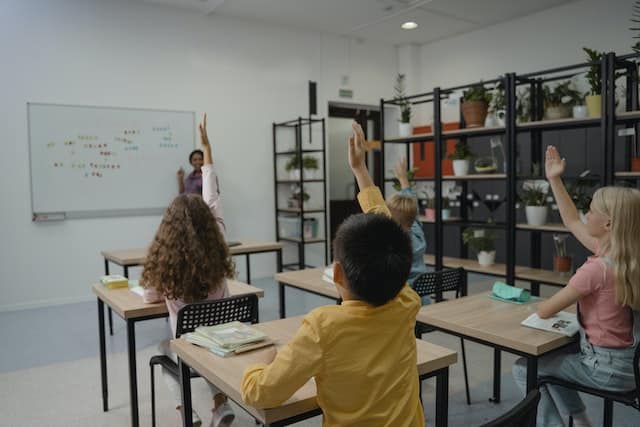As a teacher, one of the most important skills to master is classroom management to maintain effective teaching for your students.
In today's world, classrooms can be more diverse and unpredictable than ever, and effective management of students and their behaviors is essential to ensure a productive and safe learning environment.
Research has shown that classroom management is an important factor in improving student learning and social-moral development. It involves clear communication of behavioral and academic expectations, as well as a positive teaching environment.
To help teachers manage their classrooms more effectively, this article will provide a comprehensive overview of some key classroom management tips.
We'll discuss the importance of establishing a positive class atmosphere, creating classroom rules, managing student behavior, and providing constructive feedback.
With the right teaching tools and strategies, teachers can create a dynamic and successful learning environment for their students.

What are Some Effective Classroom Management Techniques as a Teacher?
As an educator, classroom management is an essential skill that should not be overlooked.
It can be challenging to manage a classroom of diverse students with different learning needs, personalities, and behavior patterns.
However, with the right approach and techniques, you can transform your classroom into a conducive learning environment.
Here are some effective classroom management tips to revamp your teaching style:
1. Create a Positive Learning Environment
Creating a positive learning environment is key for any classroom. It sets the tone of the classroom, which can affect a student’s academic success and emotional well-being.
Start every day with a positive attitude and greet each student with a smile and kind words.
Encourage positive interactions and behavior among students, and make sure to recognize and reward good behavior.
Give students autonomy and encourage them to think critically by engaging them in meaningful discussions.
When students feel respected and comfortable, they are more likely to participate and learn.
2. Establish Clear Rules and Classroom Expectations
Establishing clear rules and expectations is essential for successful classroom management.
When students know what you expect of them, it is much easier to create an environment of respect and responsibility.
Rules should be clear, specific, and concise, and should be written in a friendly, approachable tone.
Additionally, it is important to have consequences for breaking the rules and to be consistent in enforcing them.
Doing so will help foster an atmosphere of respect and responsibility in your classroom.
3. Build Positive Relationships
Build a positive relationship with your students to create a comfortable and welcoming classroom environment.
Take time to get to know your students and their interests, and show interest in their lives outside of the classroom.
This approach will help to build trust and respect between you and your students.
4. Utilize Positive Reinforcement
Positive reinforcement is a great way to encourage positive behavior in the classroom and reinforce rules and expectations.
It can come in the form of verbal praise, stickers, awards, and rewards. It's important to find what works best for your students and adjust your positive reinforcements accordingly.
Each student wants to be recognized for their hard work and accomplishments, so make sure to give them lots of praise and appreciation to boost their self-esteem.
This approach will encourage your students to continue behaving positively and create a positive learning environment.
5. Implement Engaging Activities
Use engaging class activities and learning approaches to make learning fun and exciting.
Consider incorporating games, discussions, and hands-on activities to break up the monotony of traditional classroom learning.
This approach will help to keep your students engaged and interested in learning.
6. Respect Student Autonomy
As teachers, it’s important to remember that our students are autonomous individuals, and it’s important to respect that.
Allow them to think for themselves and make their own decisions, rather than telling them what to do.
Encourage them to take initiative and make decisions for themselves, and provide them with the resources to do so.
This will help them feel empowered and motivated, and it will help them grow into more independent thinkers.
7. Be Flexible
Try to be flexible in your approach to teaching and classroom management.
Different students have different learning needs, and what works for one student may not work for another.
Be willing to adjust your teaching style and management techniques to accommodate different learning styles and personalities.
8. Monitor Student Progress Regularly
Regularly monitoring student progress should be baked into the regular teaching process.
Doing so can help you stay on top of how your students are doing and can help you adjust your teaching strategies if it looks like they’re not doing as well as you’d like.
Checking in with your students on a regular basis will also allow them to feel heard and give them an opportunity to voice any concerns they may have.
Finally, it’s important to keep track of student progress so that you can celebrate their successes as well!
Taking the time to review your student’s progress every so often can be a great way to ensure that everyone is staying on track.

Final Thoughts
Classroom management is an essential part of teaching. It is an important skill to master, as it helps create a productive and positive learning environment.
With these classroom management tips, teachers can develop strong relationships with students, set clear expectations, and encourage students to take responsibility for their learning.
Then, by implementing these tips, teachers can ensure their classrooms are safe, orderly, and conducive to learning.
Cudy helps connect tutors, students, and parents to conduct and schedule online lessons anytime and anywhere. Join Cudy and subscribe to our blog for many study tips and more!
FAQs
Why should teachers need to have good classroom management strategies?
Effective classroom management strategies help to maintain a productive and safe learning environment for students. Managing students effectively can help to ensure that they are paying attention, following directions, and behaving appropriately. Additionally, good classroom management can help to prevent conflicts and distractions from occurring.
How do you deal with inappropriate behavior in students in the classroom?
To deal with inappropriate behavior in students in the classroom, it is important to have a plan and stay calm. Then, enforce rules and handle escalating behavior, while also getting to the root of the matter.
What are the basic elements of successful classroom management plans?
The basic elements of a successful classroom management plan include setting clear expectations for students, providing effective feedback, and maintaining discipline.
What is the classroom management style?
The four main classroom management styles are authoritarian, authoritative, permissive, and indulgent.
What are the biggest challenges as a teacher to manage a classroom?
There are many challenges for a teacher to manage a classroom. Some of the biggest challenges include managing student behavior, maintaining order in the classroom, and providing effective instruction. Managing a classroom can be difficult, but with the right techniques and strategies, it can be an extremely rewarding experience for both the teacher and the students.






